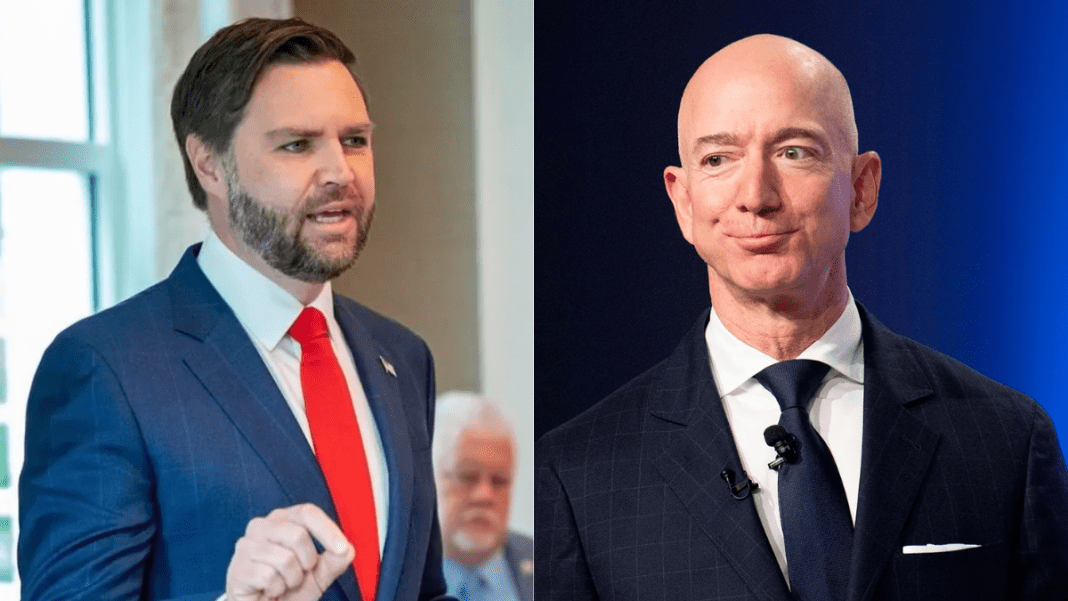A major political story spread this week after Vice President J.D. Vance revealed that he had texted Jeff Bezos, the billionaire owner of The Washington Post. In his message, Vance urged Bezos to make the newspaper more appealing to supporters of strong right-leaning, MAGA-style politics.
Vance said that inside the Washington Post, there had been a debate about how to connect with Americans who do not support left-leaning politics. To solve this, Vance told Bezos that if he truly wanted to reach those readers, he should hire Matthew Boyle, the White House Bureau Chief at Breitbart, and put him in charge of the Post’s political reporting team.
According to Vance, Bezos did not take his advice. Still, Vance argued that the newspaper has slowly become more right-leaning during Bezos’s ownership. Bezos, who bought the Post for $250 million in 2013, has long been watched closely because of the paper’s major influence on national politics.
Tension Inside the Washington Post
The Washington Post has faced internal struggles and public criticism in recent months. Many experienced reporters and opinion writers have left, and some critics believe these departures are tied to concerns about the paper’s political direction. Others claim that Bezos may be trying to improve his relationship with President Donald Trump, since their relationship had been tense in the past.
Bowman’s ballot controversy rattles Cincinnati race — and tests JD Vance’s political brand
At the same time, the Post’s editorial board showed it is not fully shifting in one direction. This week, the board published a strong criticism of President Trump after he commented on the death of former Post columnist Jamal Khashoggi, who was killed inside the Saudi Consulate in Istanbul in 2018. During an Oval Office meeting with Saudi Crown Prince Mohammed bin Salman, President Trump defended the crown prince, saying he “knew nothing about it” and that “things happen.”
However, a CIA investigation found that the killing was ordered by members of the Saudi royal family. This made Trump’s remarks especially controversial and gave the editorial board a reason to push back publicly. The moment showed that even with internal changes, the Post is still willing to challenge the current president’s statements.
A Funeral Snub and a Public Appearance
The same day these comments surfaced, Vance drew attention for another reason. A funeral was held for former Vice President Dick Cheney, and it was attended by major national leaders, including George Bush, Joe Biden, and every living former vice president: Al Gore, Dan Quayle, Mike Pence, and Kamala Harris.
Reports said that Vance was not invited to the funeral. President Donald Trump was also left off the guest list. Their absence stood out because funerals for major national figures typically include all past and present top officeholders.
Instead of attending the funeral, Vance appeared at an event hosted by Breitbart, which was streamed live on the official White House video feed. During the event, he was interviewed by Matthew Boyle — the same journalist he had recommended to Bezos. Vance praised Boyle as “the most well-sourced in Washington” and repeated why he believed Boyle was the right person to reshape the Post’s political team.
Vance again explained that he had texted Bezos because he believed the Post needed someone who could connect with the half of the country that feels ignored by mainstream news. He said it was “unfortunate for The Washington Post” that Bezos chose not to follow his advice.
These events added to a week filled with discussions about media influence, political pressure, and behind-the-scenes power struggles. With The Washington Post facing major changes, Vance’s private message to Bezos became another headline in a growing national debate.





